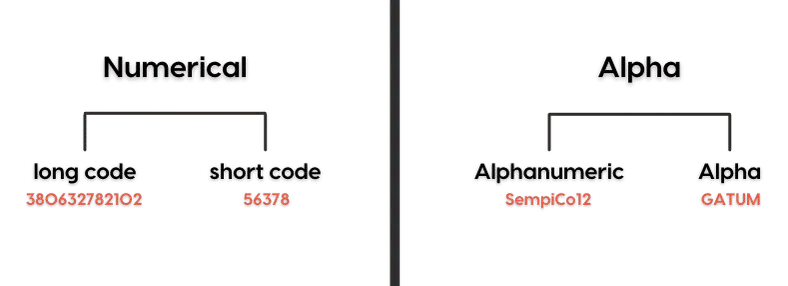Often our clients have questions about the fact that certain SMS are blocked when sending and the blocking reason is displayed as follows: “Sender is not correct”. In the description of this reason, the rule is displayed what exactly the sender should be. But often the question remains open and we decided to describe in detail the rules that the sender must comply with.
Let’s start with the name: SMS Senders can also be called – Alpha name, Sender, Originator, SenderID.
The main limitations for a sender are its length and allowed characters.
The sender can consist of Latin characters and numbers. The following is a list of characters that can be used, but there is no guarantee that the vendor will correctly omit it:
- |
- ,
- .
- ;
- %
- ‘
- “
- #
- %
- !
- ^
- –
- [
- ]
- (
- )
- /
- ~
- <
- >
- “space”
If any of these characters, a Latin letter or a number, is present in the sender, then it is already considered a separate character (and even a space must be counted).If the sender contains only numbers, then its length can NOT be more than 16 digits and it will be called Numerical senderID. It is IMPORTANT to know that the “+” sign is considered a symbol, if it is present, the sender will then consist not only of numbers.
Such senders can be divided into:
- long code – a long number, this is a full-fledged mobile number of any country (without the “+” sign);
- short code – a short number, this is a sender with a length of 3-5 digits. That is, containing only numbers, without the “+” sign.
If the sender contains not only numbers, then its length can NOT be more than 11 characters, spaces and other characters inclusive.
Such senders can be divided into:
- Alphanumeric (Alphanumeric or alpha-numeric) – i.e. consisting of both letters and numbers;
- Alpha sender – consisting entirely of letters, no numbers.

Based on the above, our platform checks the sender for valid characters and valid length and determines the type of the sender (Digital (long code or short code) or Alpha (Alphanumeric or Alpha)). Depending on this, it builds a routing using normal routing or routing specifically for a given sender or a list of senders.
Based on our experience, clients still sometimes send us senders that exceed the above parameters, but our platform in such cases simply blocks these SMS and does not accept them.
You can see the methodology for using senders in routing in the video at the link.
